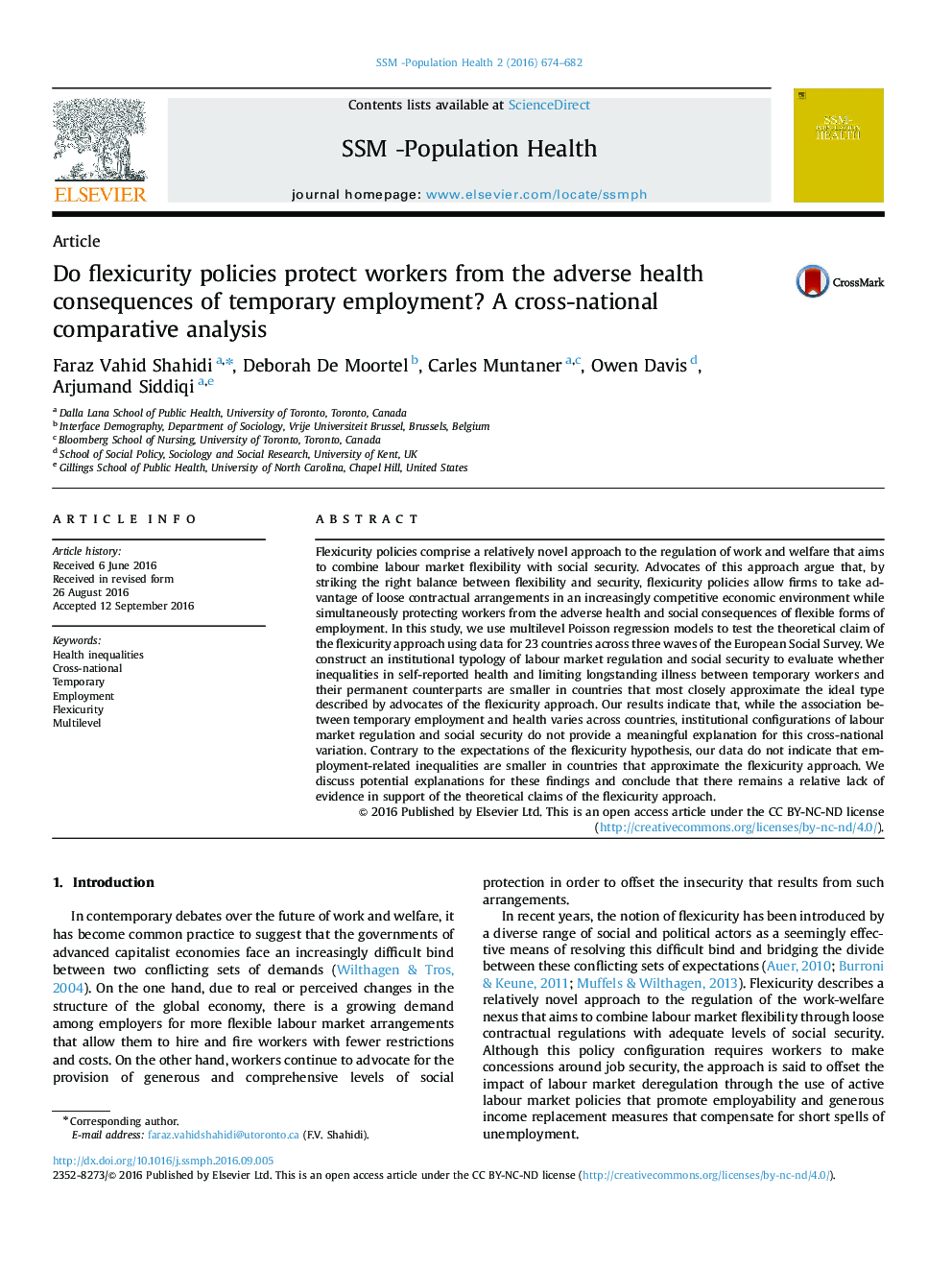| کد مقاله | کد نشریه | سال انتشار | مقاله انگلیسی | نسخه تمام متن |
|---|---|---|---|---|
| 7528308 | 1487260 | 2016 | 9 صفحه PDF | دانلود رایگان |
عنوان انگلیسی مقاله ISI
Do flexicurity policies protect workers from the adverse health consequences of temporary employment? A cross-national comparative analysis
ترجمه فارسی عنوان
آیا سیاست های انعطاف پذیری از محافظت کارکنان از عواقب ناشی از اشتغال موقت محافظت می کند؟ تجزیه و تحلیل مقدماتی بین المللی
دانلود مقاله + سفارش ترجمه
دانلود مقاله ISI انگلیسی
رایگان برای ایرانیان
کلمات کلیدی
نابرابری های بهداشتی، بین المللی، موقت، استخدام، انعطاف پذیری، چندسطحی،
ترجمه چکیده
سیاست های انعطاف پذیری، یک رویکرد نسبتا جدید برای تنظیم کار و رفاه است که هدف آن ترکیب انعطاف پذیری بازار کار با امنیت اجتماعی است. طرفداران این رویکرد معتقدند که با برآورده شدن تعادل مناسب بین انعطاف پذیری و امنیت، سیاست های انعطاف پذیری و امنیت، به شرکت ها امکان می دهد که از توافق نامه های قراردادی شان در محیط اقتصادی فزاینده اقتصادی بهره مند شوند، در حالی که همزمان محافظت از کارگران از عواقب نامطلوب سلامت و عواقب اجتماعی شکل های انعطاف پذیر . در این مطالعه، از مدل رگرسیون چند جانبه پوآسون برای تست ادعای نظری رویکرد انعطاف پذیری با استفاده از داده ها برای 23 کشور در سه موج از نظرسنجی اجتماعی اروپایی استفاده می کنیم. ما یک طبقه بندی سازمانی تنظیم مقررات بازار کار و امنیت اجتماعی را برای ارزیابی اینکه آیا نابرابری در سلامت خود گزارش شده و محدود کردن بیماری های طولانی مدت بین کارگران موقت و همتایان دائمی آنها در کشورهایی است که تقریبا نزدیک به نوع ایده ای است که توسط طرفداران روش انعطاف پذیری شناخته شده اند، . نتایج ما نشان می دهد که در حالی که رابطه بین اشتغال موقت و سلامت در کشورهای مختلف متفاوت است، تنظیمات سازمانی تنظیم بازار کار و تامین اجتماعی توضیح معنی داری برای این تغییرات بین المللی ارائه نمی دهد. برخلاف انتظارات فرضیه انعطاف پذیری، اطلاعات ما نشان می دهد که نابرابری های مربوط به اشتغال در کشورهایی که تقریبا رویکرد انعطاف پذیری را در بر می گیرند، کوچکتر است. ما در مورد توضیحات بالقوه برای این یافته ها بحث می کنیم و نتیجه می گیریم که فقدان شواهدی نسبی در حمایت از ادعاهای نظری از رویکرد انعطاف پذیری وجود دارد.
موضوعات مرتبط
علوم انسانی و اجتماعی
علوم اجتماعی
سلامتی
چکیده انگلیسی
Flexicurity policies comprise a relatively novel approach to the regulation of work and welfare that aims to combine labour market flexibility with social security. Advocates of this approach argue that, by striking the right balance between flexibility and security, flexicurity policies allow firms to take advantage of loose contractual arrangements in an increasingly competitive economic environment while simultaneously protecting workers from the adverse health and social consequences of flexible forms of employment. In this study, we use multilevel Poisson regression models to test the theoretical claim of the flexicurity approach using data for 23 countries across three waves of the European Social Survey. We construct an institutional typology of labour market regulation and social security to evaluate whether inequalities in self-reported health and limiting longstanding illness between temporary workers and their permanent counterparts are smaller in countries that most closely approximate the ideal type described by advocates of the flexicurity approach. Our results indicate that, while the association between temporary employment and health varies across countries, institutional configurations of labour market regulation and social security do not provide a meaningful explanation for this cross-national variation. Contrary to the expectations of the flexicurity hypothesis, our data do not indicate that employment-related inequalities are smaller in countries that approximate the flexicurity approach. We discuss potential explanations for these findings and conclude that there remains a relative lack of evidence in support of the theoretical claims of the flexicurity approach.
ناشر
Database: Elsevier - ScienceDirect (ساینس دایرکت)
Journal: SSM - Population Health - Volume 2, December 2016, Pages 674-682
Journal: SSM - Population Health - Volume 2, December 2016, Pages 674-682
نویسندگان
Faraz Vahid Shahidi, Deborah De Moortel, Carles Muntaner, Owen Davis, Arjumand Siddiqi,
